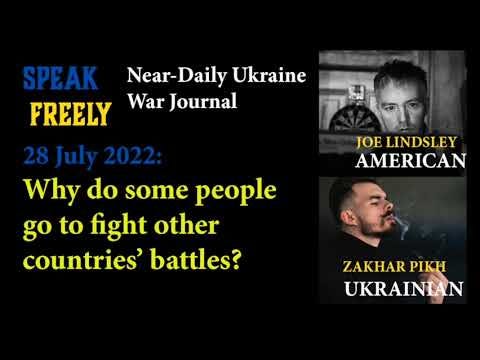Why do some people go to fight other countries’ battles?
Truth to the World | Supplies to Ukraine
You can follow and support us by visiting our new website Ukrainian Freedom News. If you subscribe to our Telegram Channel, we can send you updates without social media’s algorithmic interference.
Near-Daily War Journal Podcast: 28 July: Why do some people go to fight other countries’ battles?
Part of the Speak Freely/Speak Sh*tty Podcast, from Ukrainian Freedom News The conversation ends in silence. You can interpret why.
Two friends, Zakhar Pikh, Ukrainian bartender before the war, and Joe Lindsley, American writer, share a near-daily audio journal about life in a time of war, with occasional guests.
Also on Spotify (except in Ukraine, where Spotify doesn’t allow podcasts):
Daily Situation Summary, 29 July: Ukraine is ready to export grain, mass damage in the regions
by PAVLO VITENKO
Summary by Oblasts (regions)
LUHANSK REGION
Yesterday, the Russians hit with four missiles, used barrel, rocket artillery and mortars 13 times. The situation in the region remains critical. In Severodonetsk, Rubizhne and Lysychansk, they are trying to demonstrably organize the issuance of pensions. There is no talk of opening banks, let alone ATMs.
DONETSK REGION
The cities and villages of the region, in particular — Avdiivka, Bakhmut, Krasnohorivka, Hirnyk, were fired at from artillery, "Hrad" and "Uragan" anti-aircraft missiles. Kamianka, village Orlivka, the village of New York and others. 10 private residential buildings and 3 high-rise buildings, power lines of Avdiivska Coke Plant were damaged.
Pokrovsk was shelled by rockets at night. The number of victims is being clarified. Shelling of Slovyansk, there were wounded. Information about the injured people and the consequences of the shelling are being clarified. During the day, 8 people died in the region, 19 were injured, 8 high-rise buildings, 13 private houses and 3 entertainment centers were damaged.
CHERNIHIV REGION
This morning and yesterday evening — 2 shelling of the border in the Novgorod-Siverskyi district, artillery, "Hrad'' and mortars. Without victims and destruction. Other circumstances are being clarified.
KHARKIV REGION …
Read the full report at Ukrainian Freedom News.
Here Was This Morning in Mykolaiv
"These are just notes about freedom. I wish you had the time to read them." —Swedish band Act II
Imagine going out for a morning walk with your dog and then your city gets his by a barrage of Russian missiles. This is the result, from the ship-building city of Mykolaiv this morning.
🎙🎙🎙 Chicago WGN Radio Daily Ukraine Report:
(1) Why some Americans say Zelenskiy Vogue Cover Means War Is Fake
Joe Lindsley of Ukrainian Freedom News speaks in a daily report with Bob Sirott of Chicago’s WGN Radio about Annie Leibowitz’s photograph of Olena Zelenska and about how some Americans like Tucker Carlson say the war is somehow fake. You can listen here.
(2) Finding power in a hidden mountain ceremony on a special Ukrainian holiday
Listen here or read below:
IN A CEREMONY deep in the mountains at the tomb of an ancient Ukrainian prince, I saw the defiant soul of people who will not be slaves again. From that place and moment, I drew power.
Today, for the first time, is Ukrainian Statehood Day. By design, it is on the Feast of St. Volodymyr, who 1,034 years ago, as Grand Prince of the Kievan Rus people, became a Christian, 150 years before Moscow was even a city.
To mark the moment, I went with my friend @volodymyr__k to the remote tomb of St. Volodymyr’s son, Prince Sviatoslav, killed in 1015 in the Carpathian mountains while he was en route to Europe to seek help while his nation faced an existential threat.
Along with a small crowd of people wearing the traditional embroidery, we entered a mountain glen, reachable by a swinging bridge across the River Resistance (Опір). Ahead: a burial mound with a soaring cross-topped monument, the tomb of Sviatoslav.
Three women in traditional white dresses sang, in their voice a wild, deep power: defiance, resistance, nobility. People who ‘will not be slaves again.’
Behind the singers stood teenagers in fatigues, holding the Ukrainian flag.
—“Slava Yesusu Christu,” said the mayor.
—“Slava navidka,” glory forever, said the people.
—“Slava Ukrainii,” said a girl in fatigues.
—“Heroim Slava,” glory to the heroes, said the people.
—“Slava Natsii,” glory to the nation, said the girl.
—“Smert vorohom,” death to our enemies, said the people.
The trio then sang a song about the Kievan Rus, “our Rus” they said.
THE KIEVAN RUS were so called because their ancestors, the Rus, came from what is now Sweden, which the Finns still call "Ruotsi."
Moscow later took the title "Russian" from Rus, but by enslaving others, they missed the greatest legacy of the Rus, and their Cossack descendants: freedom.
Now the date that matters is February 24, 2014, when the Pro-Moscow, pro-Putin, pro-tyranny regime fled from Kyiv back to Moscow. The Ukrainian people, young and old alike standing in the public square, won.
As my friend Volodymyr said, it was a “paradigm shift from slavery to freedom."
Here’s a Ukrainian Song For You:
“Все буде добре” / vse buda dobre / “everything will be good” by the band Okean Elzy, whose lead singer is a physicist who also was a member of the Ukrainian parliament




